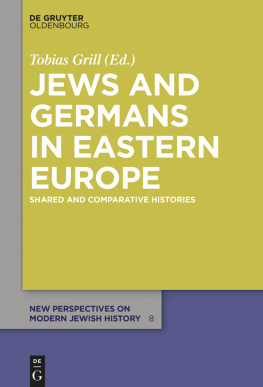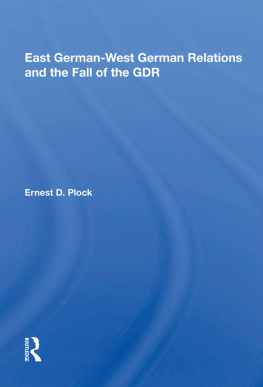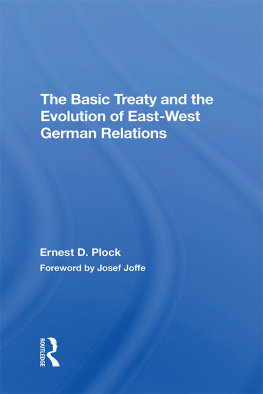The German Myth of the East
Over the last two centuries and indeed up to the present day, Eastern Europes lands and peoples have conjured up a complex mixture of fascination, anxiety, promise, and peril for Germans looking eastwards.
Across the generations, a varied cast of German writers, artists, philosophers, diplomats, political leaders, generals, and Nazi racial fanatics have imagined (often in very different ways) a special German mission in the East, forging a frontier myth that paralleled the American myths of the Wild West and Manifest Destiny. Through close analysis of German views of the East from 1800 to our own times, The German Myth of the East reveals that this crucial international relationship has in fact been integral to how Germans have defined (and repeatedly redefined) themselves and their own national identity. In particular, what was ultimately at stake for Germans was their own uncertain position in Europe, between East and West. Paradoxically, the East came to be viewed as both an attractive land of unlimited potential for the future and as a place undeveloped, dangerous, wild, dirty, and uncultured.
Running the gamut from the messages of international understanding announced by generations of German scholars and sympathetic writers, to the violent racial utopia envisaged by the Nazis, German imaginings of the East represent a crucial, yet unfamiliar, part of modern European history, and one that remains fundamentally important today in the context of an expanded European Union.
Vejas Gabriel Liulevicius is Professor of History at the University of Tennessee
The German Myth of the East
1800 to the Present
Vejas Gabriel Liulevicius


Great Clarendon Street, Oxford ox2 6Dp
Oxford University Press is a department of the University of Oxford.
It furthers the Universitys objective of excellence in research, scholarship,
and education by publishing worldwide in
Oxford New York
Auckland Cape Town Dar es Salaam Hong Kong Karachi
Kuala Lumpur Madrid Melbourne Mexico City Nairobi
New Delhi Shanghai Taipei Toronto
With offices in
Argentina Austria Brazil Chile Czech Republic France Greece
Guatemala Hungary Italy Japan Poland Portugal Singapore
South Korea Switzerland Thailand Turkey Ukraine Vietnam
Oxford is a registered trade mark of Oxford University Press
in the UK and in certain other countries
Published in the United States
by Oxford University Press Inc., New York
Vejas Gabriel Liulevicius 2009
The moral rights of the author have been asserted
Database right Oxford University Press (maker)
First published 2009
First published in paperback 2010
All rights reserved. No part of this publication may be reproduced,
stored in a retrieval system, or transmitted, in any form or by any means,
without the prior permission in writing of Oxford University Press,
or as expressly permitted by law, or under terms agreed with the appropriate
reprographics rights organization. Enquiries concerning reproduction
outside the scope of the above should be sent to the Rights Department,
Oxford University Press, at the address above
You must not circulate this book in any other binding or cover
and you must impose the same condition on any acquirer
British Library Cataloguing in Publication Data
Data available
Library of Congress Cataloging in Publication Data
Liulevicius, Vejas G.
The German myth of the East: 1800 to the present/Vejas Gabriel Liulevicius.
p. cm.
Includes bibliographical references and index.
ISBN 9780199546312
1. GermanyRelationsEurope, Eastern. 2. Europe, EasternRelationsGermany.
3. Europe, EasternForeign public opinion, GermanHistory. 4. Psublic opinionGermanyHistory. 5. National characteristics, German. I. Title.
DD120.E852L58 2010
303.48 243047dc22
2009024505
Typeset by Laserwords Private Limited, Chennai, India
Printed in Great Britain
on acid-free paper by
MPG Biddles Ltd, Kings Lynn, Norfolk
ISBN 9780199546312 (Hbk.)
ISBN 9780199605163 (Pbk.)
10 9 8 7 6 5 4 3 2 1
2 4 6 8 10 9 7 5 3 1
This book is dedicated to Kathleen.
Contents
List of Plates
List of Maps
1
Introduction
The German encounter with Eastern Europes lands and peoples began long before Germany existed as a unified nation-state. As a result, German nationalism, German thinking about the East, and German political organization and statehood have all evolved simultaneously, and are all tied together with evolving relationships with the neighbours to the East.
For Germans over the last two hundred years, the concept of the East has been an existential question. It established a durable reflex of looking at the East as both a site of the future and its promise and at the same time a location of peril, associated with the past. The encounter with the East took place across a vast geographic vista, including many places where the German element, once so crucial, is now missing. German populations stretched from the Volga to the Baltic to the Balkans, the Carpathian Mountains, Bukowina, Transylvania, Hungary, the Sudeten mountain range, Silesia, Prussia, Pomerania, Livland, Estland, Volhynia, Bessarabia, Bohemia, Moravia, Slovakia, Slovenia, Croatia, Serbia, Crimea, Ukraine, Poland, Vojvodina, Banat, and many other eastern parts of the continent.
How could so many Germans over the last two centuries have so often seen Eastern Europe at one and the same time as both a dirty Wild East marked by chaos and disorganization, and yet also as a land of tremendous future possibilities and potential for Germans? The answer lay in the enduring tradition of seeing a German cultural mission in the East, a frontier myth (a European cognate to American ideas of Manifest Destiny in the nineteenth century, which endure in popular culture to this day).
The aim of this book is to demonstrate that there has been a durable fascination with the East in German culture and thought precisely as a projection of hopes and anxieties about Germany itself. This study obviously cannot be exhaustive, noting every appearance of ideas about the East, but it will give many examples, from high culture to popular culture, to demonstrate the ubiquity of these concerns, and to show how important thinking about the East has been in defining and repeatedly redefining German national identity in the modern period. That durable German discourse about the East constitutes a myth, which has powerfully affected politics and culture.
A natural point of departure is to grapple with some problems of definition, establishing how the terms German, myth, and East are used in this study. The very difficulties that these definitions present are historically significant.
The group called the Germans examined in this study includes not only the populations inhabiting the territories of the German nation-state established comparatively late in European history in 1871, but rather includes also German-speakers elsewhere, especially the Austrian Germans, who were part of a larger cultural community of German-speaking Central Europe until that fateful divergence of the late nineteenth century. Throughout the modern period, the question of what it means to be German has returned and has been answered in differing ways at different historical junctures.









